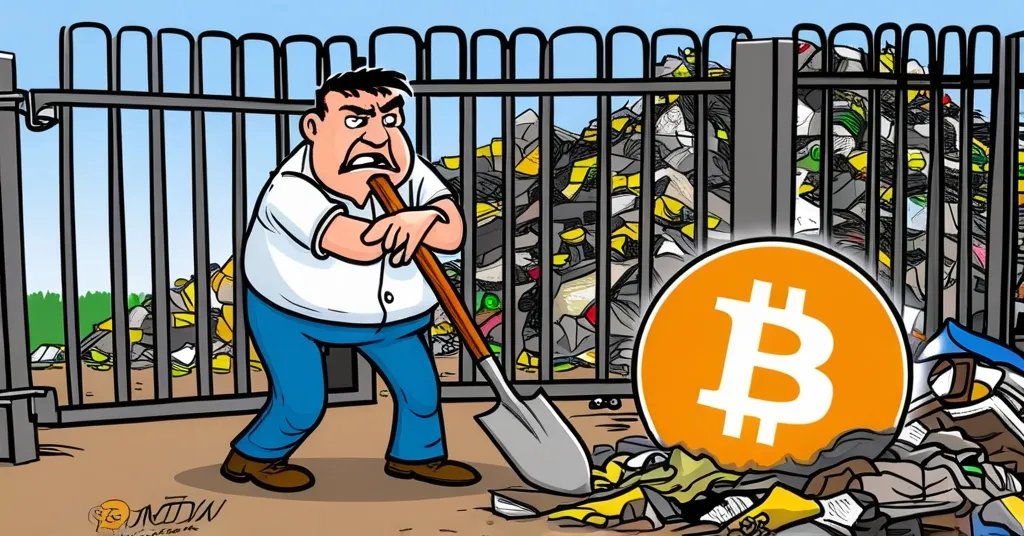Judge Rejects $750M Bitcoin Landfill Retrieval Bid in Newport

Bitcoin in the Trash: $750M Lost as Judge Rejects Man’s Landfill Retrieval Bid in Newport
James Howells, an IT engineer from Newport, Wales, has lost a decade-long legal battle to retrieve a hard drive containing 8,000 Bitcoins, valued at $700-750 million, from a local landfill. The Cardiff High Court dismissed his lawsuit against Newport City Council, citing environmental concerns and the council’s ownership of the landfill contents.
- Cardiff High Court dismisses lawsuit against Newport City Council
- 8,000 Bitcoins on discarded hard drive worth $700-750 million
- Environmental concerns cited as primary reason for rejection
- Howells mined Bitcoin in 2009, discarded hard drive in 2013
The saga of James Howells reads like a plot from a crypto-thriller. Back in 2009, when Bitcoin was worth pennies, Howells mined these 8,000 Bitcoins on his laptop. Fast forward to 2013, a moment of misfortune led him to accidentally discard the hard drive containing this digital treasure. Since then, he’s been on a relentless quest to reclaim it, even pinpointing its location to a specific 100,000-tonne section of the landfill amidst 1.4 million tonnes of waste.
Despite Howells’ detailed plan for excavation managed by FLI Group, a company known for landfill remediation, the Cardiff High Court dismissed his lawsuit against Newport City Council. Judge Keyser KC ruled there were no “reasonable grounds” for the claim, emphasizing the environmental risks and the council’s ownership of the landfill contents. This decision was rooted in UK law, specifically Section 14(6)(c) of the Control of Pollution Act 1974, which states that any item deposited in a landfill becomes the property of the council. The ruling has effectively dashed Howells’ hopes of retrieving his lost fortune.
Howells sought either permission to excavate the site or £495 million in compensation, generously offering to share the recovered Bitcoin with the council and the local community. Yet, his efforts were thwarted by stringent environmental regulations and the council’s firm stance that excavation was not feasible. The court’s decision also highlighted a crucial legal distinction: while Howells retains ownership of the Bitcoin on the blockchain—a digital ledger of all cryptocurrency transactions—the physical hard drive’s ownership is legally transferred to the council upon disposal.
The ruling underscores the complexities of dealing with physical storage of digital assets like cryptocurrencies—digital or virtual currencies that use cryptography for security. This case also brings to light the importance of timely legal action, as Howells’ claim, initiated in 2024, was over a decade after the hard drive’s disposal, falling subject to the six-year limitation period under the Limitation Act 1980.
Reacting to the ruling, Howells expressed his frustration, calling it a “kick in the teeth.” His story serves as a stark reminder of the challenges faced by early adopters of digital currencies and the broader issues related to environmental regulations and landfill management.
This case not only reflects the challenges faced by early adopters of digital currencies but also raises questions about the legal frameworks governing digital property. As Bitcoin continues its journey from obscurity to mainstream, stories like Howells’ highlight the potential pitfalls and the need for secure storage solutions.
The saga of James Howells and his lost Bitcoin is more than just a personal tragedy; it’s a cautionary tale for the entire crypto community. It underscores the delicate balance between individual rights and public safety, as well as the need for clearer legal definitions around digital assets. While Howells’ dream of retrieving his digital fortune may be dashed, his story continues to resonate within the crypto world, serving as a reminder of the importance of secure storage and the unpredictable nature of this groundbreaking technology.
For Bitcoin maximalists, this case reaffirms the importance of decentralization and the security that comes with it. While altcoins and other blockchains like Ethereum serve unique roles in the financial revolution, this incident underscores why many still advocate for Bitcoin’s robust security measures and its push towards disrupting the status quo. Effective accelerationism, or e/acc, in action, perhaps?
Key Takeaways and Questions
- What was the outcome of James Howells’ lawsuit against Newport City Council?
James Howells’ lawsuit was dismissed by the Cardiff High Court, preventing him from retrieving a hard drive containing 8,000 Bitcoins from a landfill owned by the council.
- Why did the court reject Howells’ claim?
The court rejected the claim due to environmental concerns and the council’s ownership of the landfill contents, ruling that there were no reasonable grounds for the claim.
- How much are the Bitcoins on the hard drive worth now?
The 8,000 Bitcoins on the hard drive are currently valued between $700-750 million.
- What did Howells offer to the council and local community if he was allowed to excavate the landfill?
Howells offered a share of the recovered Bitcoin to both the council and the local community.
- When did Howells mine the Bitcoin, and when was the hard drive discarded?
Howells mined the Bitcoin in 2009, and the hard drive was accidentally discarded in 2013.



